 Debora Tebovich – Argentina
Debora Tebovich – Argentina
Debora (Debbie) Tebovich is a passionate teacher who teaches face-to face and one-to-one at home. Also she has begun teaching online because commuting in the city has become a great challenge. She lives and works in Buenos Aires. She is passionate about teaching teenagers and adults. She believes in the big power of learning together with learners, empowering each other and growing as human beings who are part of a huge community of people. She is also an avid home-keeper and loves gardening. She would rather be gardening in her hometown, but her balcony makes her happy! She loves swimming and walking on sunny days yet, wouldn’t mind going out in the rain.
What are you passionate about, Debbie?
Teaching, learning, and writing are definitely my passions as well as being a mother and taking care of the home. What I love most about teaching is how much we can learn together with students and within communities of educators from all over the world. I can teach the same lesson twice and it’s never the same. My students are special and different which makes them unique, so we start the journey into a topic and they can lead me to something unexpected, which I grab quickly because it’s what they have discovered and it triggers motivation through curiosity. If we can’t do it right at that moment, I take notes and we return the following class. As I love to say, I might hold their hands to begin the journey but it’s them who become the guiding force in my classroom. Also, as they learn how much we connect with the world, they learn we are part of community, that we are people helping and learning together. That’s so amazing about teaching and learning, isn’t it?
How and why did you become a teacher?
I can’t remember when, I guess I was still crawling. I opened a language school with a partner and it was a boom. We had over 200 students the first year in a little town. But after some time, I discovered I enjoyed little classes that were more intimate, so with time also I started following my heart and I ended up teaching small groups. Now more matured, freer to follow my own decisions and dreams, I teach at home one to one, or in very little groups. I cook something for my students and we share coffee while we learn. IF you’d like to hear me talk more about this question with perhaps some brutal honesty, please click here to listen if you’d like:
What are you most interested in right now?
Right now, I am interested in lesson planning and developing my own material. I started a project to involve my students in the decision of what we want to do in class, and what we can agree would be best for them to do in class. You can see some of that goal setting work with student here.
http://datenglish-portfolio.blogspot.com.ar/2012/07/setting-goals-with-students.html
Also, as I have learnt and believe so strongly in the power of a community of passionate teachers, I am working on a project to take other teachers’ material and, as far as possible, see if it can be enriched as I develop adapt it for my students. The idea is, if we are a community, why would we start creating from scratch if we can use material developed and shared by other members and make it richer by adding something new. In the same way, this material would get incredibly rich if other teachers do the same. Imagine how much we would have! Also, I am very concentrated on developing as a teacher. In fact the more I study and learn, the more I see I have to go on. I guess this is not new but I just feel it so strong inside.
What things do you do to help you get better at being a teacher?
I do most of my professional development online. First because I can choose the area I am interested in and because I have met incredible teachers just willing to share and encourage us to try new things.
Now I am more careful about recording the courses I take and I have made a grid where I collect info about my CPD, very simple but I know when I took a webinar, or course, who was the teacher, what I have learnt and the links to the new material.
What’s the biggest challenge you face as a teacher at this moment?
One big challenge is managing time and resources. There’s so much going on, it’s time consuming and I usually spend long hours trying to keep updated. So, sometimes it’s really challenging to figure out what is the best course of action to take to make my classes better. My ultimate goal is to teach in a way in which students feel comfortable as they develop their self- esteem and find that learning can be fun, in a way that empowers them and myself as human beings — and I am beginning to see great results. My students are more open to agreeing and disagreeing, also the value the work we do together, teenagers have learnt they read to discover and learn something new and not just get a pass on a test. I think this is the most rewarding result.
Also I read lots of blogs by great teachers absolutely passionate about their work, but as technology becomes so important I see we tend to spend a lot of time discovering new tools and blogging about them. I love tech tools too, but I have come to the point that my commitment is to be close to what my students need and design the best plans and projects. This is what I see they need the most, a great idea, something great to discover. I tell them the most important thing is to have something great and interesting to share. Then, if I think a tool will make the work easier or more attractive somehow, I suggest using technology.
I have the feeling that technology is exciting but I am beginning to feel it is something similar to fast food. Maybe it’s a cheap metaphor but I have discovered that there’s nothing like homemade food.
There’s nothing like going out on a sunny day to take a walk and bring our cameras along. Then we sit on a nearby park bench, and we talk about the photos we took, which usually takes us to some stories and if they allow me, I record them. We come back to the classroom and we exchange feedback about our walk.
We use technology when we watch a video clip or read something online, or do research. Sometimes we write together so we can use technology to make our own e-books, and this gives learners the feeling of having a broader audience, like “someone out there is reading my work”. We also work on writing trip journals using technology and I encourage them to record some work, only to see how they make progress.
What advice would you give to a teacher just starting out on a journey of professional development?
I would love to accompany a new teacher beginning on her or his journey. I had felt lonely many times, until I discovered the most incredible force: the power of communities. This has helped me to get the best from myself. However, there is a road to reach this point. I would say that getting a twitter account was the first thing I did and that you should do if you don’t have one. My first tweet was, “Can anybody tell me what Web 2.0 means, please?” It still makes me laugh, but little by little I found that somebody has answered every time I asked for help. It still surprises me.
Debbie, is there any blog or online link you’d like to recommend?
The blogs depend on the area of interest, and it takes some time to discover, who out there, is on a similar path. There are so many incredible bloggers on different areas, like reflecting upon teaching, technology applied to the classroom, lesson plans, or the BBC always providing great links. I think that one of the first teachers in Twitter who answered me was Lisa Dabbs, then Shelly Terrell. I still wonder how she manages to cope with so many things. Then there is Marisa Constantinides, Cecilia Lemos, Sandy Millin, Carla Arena, Scott Thornbury, Steven Herder, Barb Sakamoto, Nik Peachey, and my good friend Chuck Sandy, whom I can’t thank enough. You have given me the courage and trust I could not find anywhere. I never felt alone after I knew that there was a group of people you lead who rushes to answer and comment or at least “like” every challenge you share.
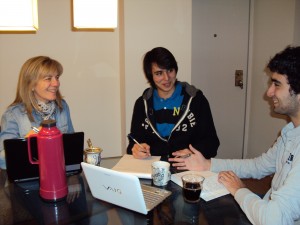 What’s your favorite quote about being a teacher, Debbie?
What’s your favorite quote about being a teacher, Debbie?
Gandhi’s “Be the change you want to see in the world” applied both to everyday life and education. For me teaching is inseparable from who I am as a person.
Is there any question I didn’t ask that you’d like to answer? That is, is there anything else you’d like to say?
Yes, thank you! I started this journey two years ago, and I just never thought I would be writing this. I know how my journey started, but I can’t say exactly how or what I have done, or define all the twists and turns on my journey that have allowed me to reach this point. And I know, and need to remember that it is just the beginning.


 Annie Tsai – Taiwan
Annie Tsai – Taiwan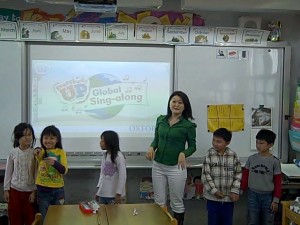 Any blog or online link you’d like to recommend?
Any blog or online link you’d like to recommend?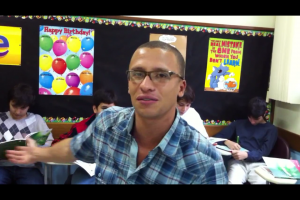 Bruno Andrade – Brazil
Bruno Andrade – Brazil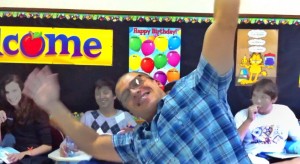 What’s your favorite quotation about being a teacher, Bruno?
What’s your favorite quotation about being a teacher, Bruno? Debora Tebovich – Argentina
Debora Tebovich – Argentina What’s your favorite quote about being a teacher, Debbie?
What’s your favorite quote about being a teacher, Debbie? Josette LeBlanc – Korea
Josette LeBlanc – Korea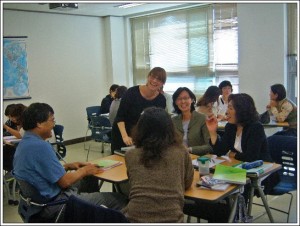 What’s your favorite quotation about being a teacher?
What’s your favorite quotation about being a teacher?